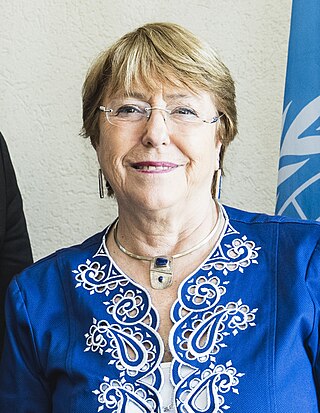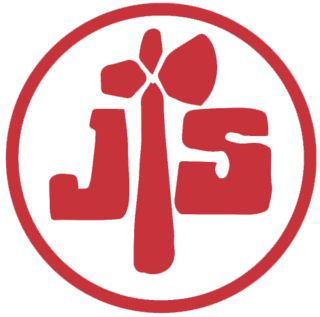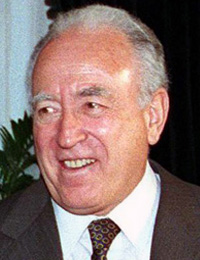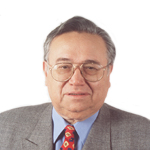
The Christian Democratic Party is a Christian democratic political party in Chile. There have been three Christian Democrat presidents in the past, Eduardo Frei Ruiz-Tagle, Patricio Aylwin, and Eduardo Frei Montalva.

The Socialist Party of Chile is a centre-left political party founded in 1933. Its historic leader was President of Chile Salvador Allende, who was deposed in a coup d'état by General Augusto Pinochet in 1973. The military junta immediately banned socialist, Marxist and other leftist political parties. Members of the Socialist party and other leftists were subject to violent suppression, including torture and murder, under the Pinochet dictatorship, and many went into exile. Twenty-seven years after the 1973 coup, Ricardo Lagos Escobar won the Presidency as the Socialist Party candidate in the 1999–2000 Chilean presidential election. Socialist Michelle Bachelet won the 2005–06 Chilean presidential election. She was the first female president of Chile and was succeeded by Sebastián Piñera in 2010. In the 2013 Chilean general election, she was again elected president, leaving office in 2018.

The Concertación, officially the Concertación de Partidos por la Democracia, was a coalition of center-left political parties in Chile, founded in 1988. Presidential candidates under its banner won every election from when military rule ended in 1990 until the conservative candidate Sebastián Piñera won the Chilean presidential election in 2010. In 2013 it was replaced by New Majority coalition.

Verónica Michelle Bachelet Jeria is a Chilean politician who served as President of Chile from 2006 to 2010 and again from 2014 to 2018, becoming the first woman to hold the presidency. She was re-elected in December 2013 with over 62% of the vote, having previously received 54% in 2006, making her the first President of Chile to be re-elected since 1932. After her second term, she served as United Nations High Commissioner for Human Rights from 2018 to 2022. Earlier in her career, she was appointed as the first executive director of the United Nations Entity for Gender Equality and the Empowerment of Women.

The Communist Party of Chile is a communist party in Chile. It was founded in 1912 as the Socialist Workers' Party and adopted its current name in 1922. The party established a youth wing, the Communist Youth of Chile, in 1932.

Ricardo Froilán Lagos Escobar is a Chilean lawyer, economist and social-democratic politician who served as president of Chile from 2000 to 2006. During the 1980s he was a well-known opponent of the Chilean military dictatorship and astounded contemporaries in 1988 by openly denouncing dictator Augusto Pinochet on live television. He served as Minister of Education from 1990 to 1992 and Minister of Public Works from 1994 to 1998 under President Eduardo Frei Ruiz-Tagle before narrowly winning the 1999–2000 presidential election in a runoff against Independent Democrat Union (UDI) candidate Joaquín Lavín. Lagos was the third president from the centre-left Coalition of Parties for Democracy to have governed Chile since 1990. He was succeeded on 11 March 2006 by Socialist Michelle Bachelet, from the same coalition. From 2007 to 2010 he served as a Special Envoy on Climate Change for the United Nations Secretary-General Ban Ki-moon. Lagos made an unsuccessful bid to run for president in the 2017 Chilean general election.

Claudio Huepe García was a Chilean politician, engineer and economist, member of the Christian Democrat party, who occupied several government and political positions. During his career, he was the provincial governor of Arauco, a member of the Chilean Chamber of Deputies, a government minister, and the Chilean ambassador to Venezuela. He was also among the first in his party to reject the 1973 coup by Pinochet and was exiled by the military dictatorship from 1975 until 1984.

The Socialist Youth of Chile is the youth wing of the Socialist Party of Chile. It was founded on November 4, 1935, and it incorporates young socialism activists between the ages of 14 and 30. The JS has political representation at the local and national level and its members have played a prominent role in the student organizations in Chile. According to the last internal elections, the youth wing of the socialist party currently has 8500 members.

José De Gregorio Rebeco is a Chilean economist, academic, researcher, consultant and politician. He has been the Governor of the Central Bank of Chile, Minister of the Economy, Mining and Energy during the administration of Ricardo Lagos and is currently the Dean of the School of Economics and Business of the Universidad de Chile. He is also a nonresident Senior Fellow at the Peterson Institute for International Economics.

Ricardo Andrés Lagos Weber, son of former Chilean president Ricardo Lagos, is a politician who served as the Ministry General Secretariat of Government of Chile in the administration of former President Michelle Bachelet after having worked for Bachelet's 2005-2006 campaign. He is trained in law and economics, and has served the majority of his government career in economic positions. He was also an organizer and the senior representative for Chile at the Annual Meeting of APEC held in Chile in 2004, in addition to being one of the architects of the free trade agreements that Chile signed with the United States and the European Union as the head of the Foreign Ministry's Department of Trade Policy. He is a member of the Party for Democracy (PPD). Between March 2016 and March 2017 he was President of the Senate of Chile.

The nations of Chile and Mexico established diplomatic relations in 1831, however, relations were severed in 1974 in the aftermath of the 1973 Chilean coup d'état. Diplomatic relations were re-established in 1990 and have continued unabated since.

Edmundo Jaime Pérez Yoma is a Chilean politician from the Christian Democrat Party of Chile. He was twice the Minister of Defense during the administration of President Eduardo Frei Ruiz-Tagle, and he served as the Minister of the Interior for President Michelle Bachelet's administration.
The following lists events that happened during 1972 in Chile.

Mario Adolfo del Carmen Fernández Baeza is a Chilean lawyer, professor and politician, member of the Christian Democratic Party. He served as the Minister of the Interior and Public Security in Michelle Bachelet's second term.

Claudia Pascual Grau is a social anthropologist and politician from Chile, a member of the Communist Party.

Chile–Sweden relations refers to the diplomatic relations between Chile and Sweden. Both nations enjoy friendly relations, the importance of which centers on the history of Chilean migration to Sweden during the 1970s. Approximately 100,000 Chileans and their descendants reside in Sweden, making the country home to the third largest Chilean diaspora community. Both countries are members of the Organisation for Economic Co-operation and Development.

Paula Narváez Ojeda is a Chilean politician and psychologist who is the Chile ambassador to the United Nations under President Gabriel Boric. She was elected as the seventy-ninth President of the United Nations Economic and Social Council on 27 July 2023.

Jorge Máximo Arturo Pacheco Matte is a Chilean economist and politician. He served as minister of Michelle Bachelet's second government (2014−2018), specifically in Energy.

Juan Enrique Krauss Rusque is a Chilean lawyer and politician who has served as deputy, minister and ambassador of Chile in Spain, Ecuador and Czech Republic.

Ricardo Alejandro Solari Saavedra is a Chilean economist and politician who served as leader during the governments of Patricio Aylwin (1990−1994), Ricardo Lagos (2000–2006) and Michelle Bachelet (2014−2018).


















